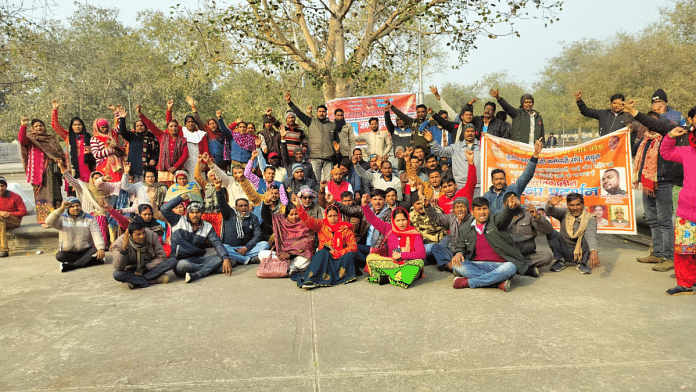Lucknow: ‘Khule saunch se mukt kiya hai humne Hindustan,
Ab humari kahi apeksha sunn lo dhar ke dhyaan,
Arey o Yogi baba, kaho UP mein kya ba!’
(We made the nation open defecation free,
Now listen to our demand carefully, o Yogi!
What’s happening in UP?)
It has been over three weeks that Swachhagrahis, the foot soldiers of the Modi government’s pet project Swachh Bharat Mission, in Uttar Pradesh are on a protest at Lucknow’s Eco Park over unpaid dues that dates back to 2019.
“We are called early in the morning to work for the Swachh Bharat Mission, and we work towards the mission till late at night. But when it comes to our compensation, our rights, our dignity, the government has clearly ignored us,” says Ramshanker Tiwari, the president of the Uttar Pradesh State Rural Swachhagrahi workers Union, who alleges that the Swachchagrahis haven’t been paid since 2019.
This is despite the Uttar Pradesh administration being well-aware of the grievances, as seen in Chief Minister Yogi Adityanath’s promise of minimum pay on Swachhata Diwas (1 Oct.) last year. “We have formed a committee to look into the wages and compensation of the Swachhagrahis in the state. I am here to assure you that we will soon resolve this issue,” he had said.
Tiwari tells ThePrint that he has support of over 8,000 Swachhagrahis from 45 districts of Uttar Pradesh, and that almost 500 people have joined him at the protest in Lucknow on a rotational basis.
The Swachhagrahis are demanding a compensation of Rs 250 a day along with a promised bonus of Rs 10,000 per ODF village. The compensation differs from the 2018 and 2021 guidelines by the Centre’s Department of Drinking Water and Sanitation, which laid down target-based incentives. The guidelines state that it will be incumbent on every state to ensure a bonus for Swachhagrahis whenever the villages are declared open defecation free (ODF).
According to the 2018 guidelines, a Swachhagrahi should be paid Rs 5 for geotagging toilets, Rs 10 household for verification of toilet usage (before PDF declaration, and Rs 15 per household (after pdf declaration) for such verification nine months after a village gets ODF tag, Rs 25 each for fixing dysfunctional toilets, as well as for retrofitting old ones, Rs 200 per village (50-100 households) for ensuring construction of covered drains, community soak pits, community compost, and Rs 200 for ensuring maintenance.
They’re further eligible for Rs 200 per village for ensuring ODF sustainable activities, and Rs 25 for construction of toilets for new families who come to the village.
In a letter dated 11 December 2021, accessed by ThePrint, the director of Swachh Bharat Mission (rural) had directed district magistrates to release compensation of Rs 150 per toilet construction as well as a bonus of Rs 10,000 per ODF village to Swachhagrahis.
The workers allege that the compensation was never received and now that they have no option but to go on protest.
The protesters, who have to leave Eco Park at dusk, sleep on the footpath and the railway station. “Dharamshalas and shelter homes charge Rs 20 a night, I don’t have that kind of money to pay for dharamshalas as well as buy food in the morning. So I have been sleeping on the footpath. I don’t have any other choice,” says Malti Devi, a Swachhagrahi from Auraiya.
On 19 January, Swachhagrahis, all of them women, tried to demonstrate in front of the Uttar Pradesh Vidhan Sabha, but were brought back to the Eco Garden.
Tiwari says no representative from Uttar Pradesh administration has come to meet them since their protest started 3 January.
ThePrint reached Panchayati Raj secretary B, Chandralekha through WhatsApp for information on the status of the committee promised by Yogi and the administration’s response to the Swachhagrahis demand. The copy will be updated once a response is received.
Also Read: Gig dream is fading for Uber, Ola drivers. They are forming picket lines & support groups
Role of Swachhagrahis
From construction of toilets to ensuring they’re running properly, to changing the habits of people and teaching them how to use the toilets, the Swachhagrahis were the grassroot-level workers who sustained ridicule, insult, isolation and even violence while trying to bring a silent revolution in the country.
At the start of the mission, these unsung heroes from various villages underwent training by the UNICEF to bring habitual changes in their communities. They would wake up at 4 a.m. in the morning and start taking rounds in villages with a whistle around their neck, discouraging people from defecating in the open.
“I used to go to people’s houses, and tell the women that defecating in the open brings them shame. They shouldn’t do it for the sake of their own dignity. I would go and talk about best practices when it comes to using the toilet. People would abuse me, threaten to hit me, I endured all of that,” Malti Devi says.
Other volunteers also talk of facing hardship in the early days of the Swachh Bharat Mission.
“In the early days of the mission, the villagers would chase us away when we approached the fields in the morning hours to dissuade people from defecating in the open. Some of our brothers and sisters have even been beaten. We sustained all this violence to ensure Uttar Pradesh becomes open defecation free. We should be given our fair compensation,” Anil Kumar from Sultanpur district says.
That was not all. These Swachh warriors would stage street plays, write songs and dance to deliver the message of sanitation and cleanliness. “Our brothers and sisters here have picked human feces with their hands and thrown it in the dustbin. There was a time when a walk in the field would soil pants with feces. Now it’s all clean. But when it comes to compensating, the government forgot us,” Kumar adds.
(Edited by Tony Rai)
Also Read: No games, medals, opportunities for fame—Haryana wrestlers lost without entering the ring



